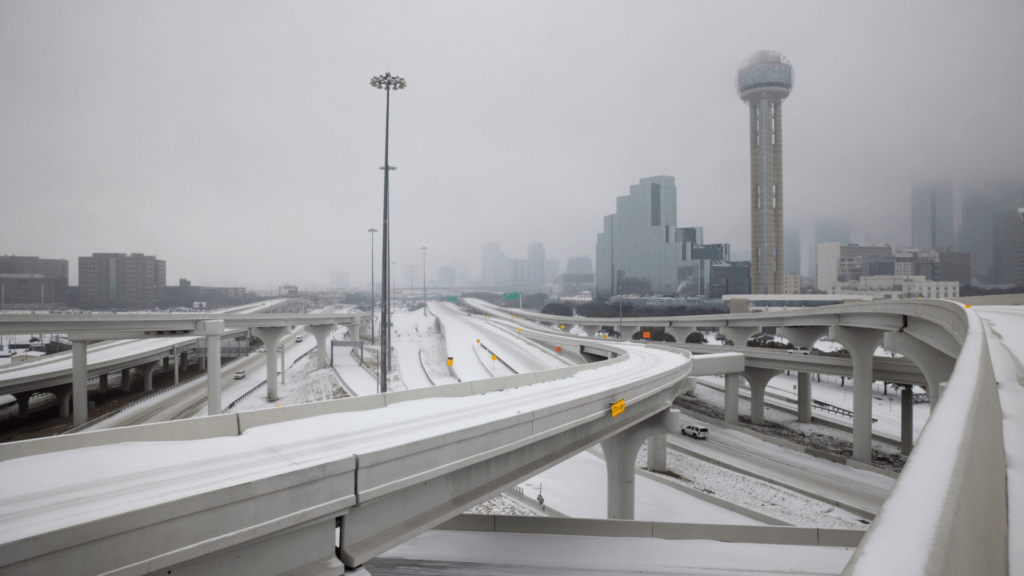
When business property is damaged, it has the potential to leave commercial property owners unsure of what is and is not covered by their insurance policies. This is especially true when an ice storm leaves a business to deal with cumbersome and costly damage. While ultimately the Texas business owner’s commercial property damage insurance policy is the best indicator for whether or not coverage is available, unprecedented weather events like ice and winter storms can leave the terms of insurance coverage ambiguous.
Ice and Winter Storm Insurance Claims
In the winter months, the potential for unpredictable weather events can increase. For instance, the right mix of cool and warm air can sometimes produce ice storms. For commercial properties located in warmer areas like Texas, these events can often be difficult to navigate. Not only that, but it can also be difficult to determine if specific instances of damage can even be covered by standard commercial property policies.
Often, following an ice storm or severe winter weather event, business owners don’t realize how badly their property has been damaged. This is because the damage can go unnoticed for weeks or even months until a roof starts leaking or cracks in plumbing begin to show. Not only that, but trees downed by ice storms can cause power outages that can cost businesses money due to unexpected closures.
Despite these and other concerns, one of the most important assets available to business owners following an ice storm is their commercial property damage insurance. These policies may provide coverage for the physical damage present after a winter weather event and for certain economic losses that may arise from being unable to conduct business at all or at the same level as before the adverse weather event. Despite this, commercial property owners can face a host of coverage issues their insurers are likely to assert in order to benefit the carrier. In Texas, insurers issue many different standard insurance industry policy forms, but some policies are specifically prepared to specifically address a business’s particular unique situation.
Therefore, it is important for commercial property owners to thoroughly review all of their entire insurance policies to determine if coverage is sufficient and/or if additional coverage is needed.
Commercial property damage following an ice storm or severe winter weather can be covered under the following types of insurance policies:
• Commercial Property Damage Insurance: This coverage typically applies to damage to or the destruction of any insured property resulting from an insured peril. Coverage is generally available for damage to the business’s properties and other structures, equipment, supplies, and other personal property; however, certain specific types of damage may be difficult to cover. For instance, burst pipes caused by an ice storm can result in water damage. Flooding, however, is rarely covered under most standard commercial property policies. A burst pipe may result in water filling up a property, but it is important to note that this is not flood damage.
• Business Interruption Insurance: Business interruption coverage typically applies to loss of earnings or revenue resulting from property damage or loss caused by an insured peril that leaves the business inoperable for some time. It is important to review this coverage closely because insurers can be very specific on what is needed to document the financial losses.
• Contingent Business Interruption Insurance: Similar to business interruption insurance, contingent business interruption coverage typically applies to losses, including lost earnings or revenue, that result from damage to the property of a supplier, customer, or some other business partner or entity that the insured business relies on to remain operational. Coverage is contingent upon that supplier or customer being unable to provide its goods/services to the policyholder.
• Civil Authority Coverage: This coverage may help when a business suffers losses arising from an order of a governmental authority that interferes with normal business operations. Similar to contingent business interruption coverage, civil authority coverage may apply even when there is no property damage.
• Service Interruption Insurance: This can help cover losses related to electric or other power supply interruptions. Often, this coverage is written to require the outage to be the result of a damage event to the utility provider’s equipment within a certain distance of the policyholder’s property.
• Extra Expense Coverage: This coverage is designed to assist with certain specified extra expenses a business incurs as a result of a loss event in order to be able to resume normal operations. If a business has unexpected costs to reopen, this type of policy or endorsement might provide some coverage.
Protecting Commercial Properties from Ice Storm Damage
Commercial property owners should plan ahead to abate the severity of winter weather and ice storm damage, including taking the following steps:
Perform Regular Inspections
Commercial property owners should regularly inspect their properties to be proactive—regardless of the season. Regular inspections can help identify potential problems, such as damaged and leaky roofs, older pipe systems that may need to be replaced, mold issues, and other needed repairs. Performing regular inspections throughout the year can keep commercial properties in better shape to handle extreme weather conditions and hopefully help mitigate potential losses.
Have a Contingency Plan
Having a well-established contingency plan in place can help keep businesses operating in the event of a natural disaster. Businesses across all industries, particularly those in food service or retail, can greatly benefit from a contingency plan for extreme weather conditions that might force them to make sudden adjustments.
For instance, restaurant contingency plans can include having additional backup vendors on hand should regular vendors become unavailable. Backup generators can also help to protect refrigerated items to prevent food spoilage during power outages. Having a reliable contractor on hand can also be of use in case electrical, plumbing, or other necessary repairs are needed.
Review Commercial Property Insurance Plans
It’s important that commercial property owners and managers meaningfully review all applicable commercial property insurance policies to ensure they fully understand the scope of coverage in anticipation of extreme weather. Verifying any policy limitations on coverage and/or identifying any endorsements under which coverage can be obtained can provide peace of mind. It’s important to note, however, that even though a business may have the necessary coverage in place, insurers can still delay, underpay, and deny property damage claims. With this in mind, business owners need to consult with a knowledgeable insurance attorney to fully understand the options available.
Ice Storm Commercial Property Damage Lawyers
Following the impact of an ice storm, you may be able to file a commercial property insurance claim to mitigate the cost of the damage. Unfortunately, insurance companies often utilize tactics to undermine the insurance claims process for their benefit. If you have timely paid your insurance premiums, filed a claim regarding ice storm damage, and been the victim of unfair tactics like denials, delays, and under-valuations, you should contact the commercial property damage lawyers at Raizner Slania to see how we can assist you with your claim.


